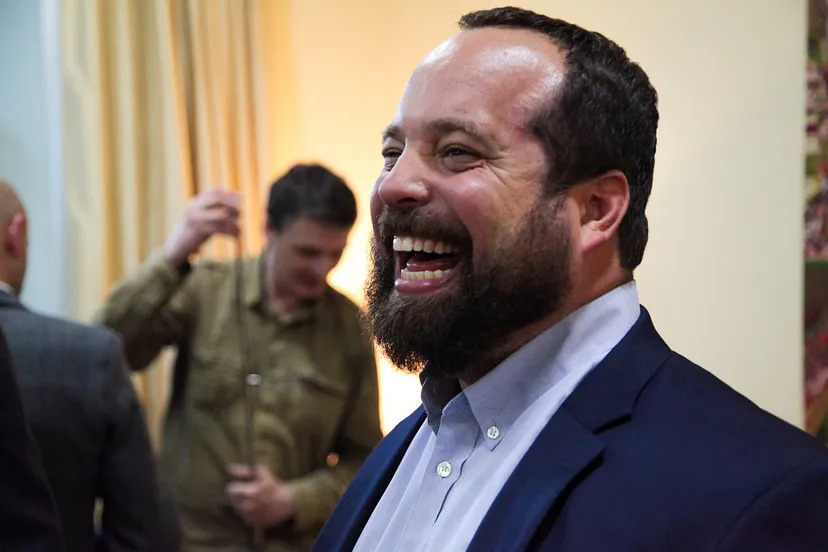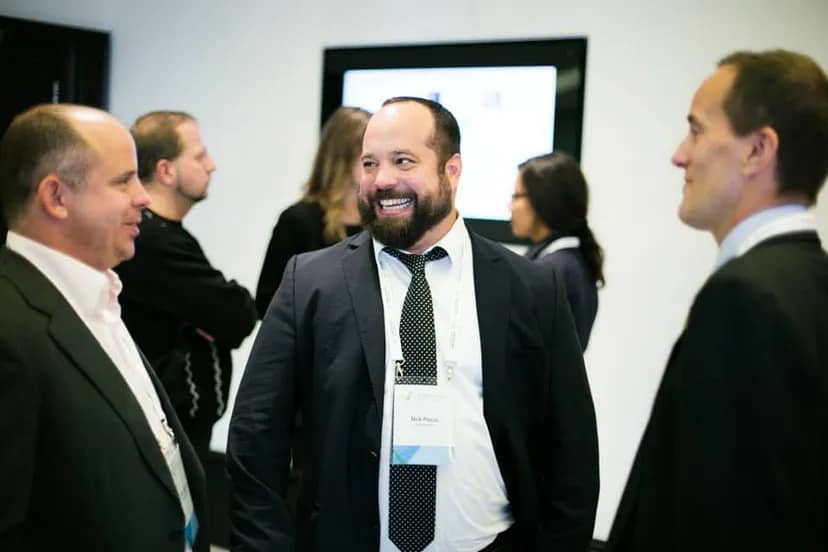
DF: The main reason of our talk today is to discuss the Work in Ukraine initiative promoted by Evgeniy Sysoev (Aventure Capital) and Aleksey Vitchenko (Digital Future). So why did you choose Ukraine as a place to move to?
NP: I can’t really say that I chose Ukraine as much as Ukraine chose me. I graduated from university in 2000 and wanted to take some time off to see the world before starting a very standard 9 to 5 job in the US. I lived in Spain for a few months where I had several odd jobs and worked on my Spanish before accepting a job teaching English in Moscow. I planned to be in Russia for about 3 to 4 months and ended up there for almost 5 years. Through my work at Interfax, I ran into people that were setting up Concorde Capital and I had my first step into investment banking there. I started out as an editor, then served as an analyst, sales rep and then as the Head of Corporate Relations. From there fate and friendships took me to the Bank of Georgia Group where I worked as the Head of Sales and CEO of the Bank’s investment division until 2012. But, to be honest, I never held a full-time job in the USA or Georgia per say. I was both in Moscow and Kyiv. The Kyiv I came to in 2004 was bursting with opportunities and there was a massive shortage of well-trained local employees in the investment business.
As my first boss who is Canadian told me when he was hiring me, as I was worried about having no experience in finance, “you probably had a job when you were ten, perhaps you had even your own small business (which I did, mowing grass for my neighbors and delivering Coca-Cola to local supermarkets and gas stations). You know, sales, marketing, commerce are the bedrock of finance and it is in your blood. The local guys are smart, well-educated, but they just don’t feel the business the way the western culture has brought you up to. Selling comes naturally to you.”
I would say this was the main reason that helped me to be successful in Ukraine. The market has grown and developed a lot since then and that wide gap has narrowed a great deal. But still, on the whole, Ukrainians are more willing to sacrifice their time for ineffective and bad goods and services than most western citizens are, and this outsider view sometimes helps me as an expat to bring a new vantage point to clients that others might not.

DF: Is there a club for expats here in Ukraine that you are aware of?
NP: Yes, we are called the Expats for Ukraine. This is a community of friends, mainly businessmen, living here 10 years or more. We meet up once a month and invite people from different backgrounds and business spheres and think over what and how we can do.
DF: Could you name the members of this group?
NP: Andrey Favorov is, probably, the most active member of our community. He is the Head of Energy Resources of Ukraine. Just in 2 years time the company turned into the largest importer of energy resources. Andrey has been in contact with partners from the USA and Europe, including Gaz de France; he raised enormous capital for our country. And now in Ukraine, we have not only Ukrainian or Russian companies dealing in import of energy resources but the foreign ones as well.
I can also name Simon Cherniavskyi, the General Director of Mriya Agro Holding, as well as Brian Best of Dragon Capital.
I can give a good example of my friend Mark Rachkevich. He arrived in Ukraine in 1990’s as a part of the World Corps mission and decided to stay on. He worked at EBRD, in infrastructure projects. Then he left for Kyiv Post. Though he did not have a degree in journalism, he became an influential journalist, cooperated with Bloomberg, with Associated Press. Mark was writing about sports. I mean a person was able to build his career in journalism in Ukraine from the ground up, because we have too few foreign journalists here. He found his niche and went into it headfirst.
DF: Right now we are faced with many security threats, security of capital among other things, but foremost, personal security. If you look at Ukraine through the prism of the news feed it may make you feel uneasy.
NP: This is a common issue, taking into account the recent developments. If we talk about petty crime then in Ukraine everything is much better in this regard compared to the West. I think this is due to the high level of secondary education and Soviet housing developments.
DF: Quite an unexpected explanation on your part. Why is that?
NP: The majority of people got their apartments from the government. That’s why poor and rich are coexisting in the same buildings. There is no drastic division between poor and elite suburbs, as in the West. Here everyone is living together.
This is clearly seen in such places as Koncha-Zaspa, where millionaires’ mansions are sitting next to some dilapidated clay houses. Many people say that this is a negative consequence of Ukrainian land laws, but I firmly believe that it is great in terms of safety.

DF: In one of your interviews you said that it’s worth moving to Ukraine if the local mentality suits you well. But how do you figure out whether it is a match?
NP: From the start, you should be ready that your stay here won’t be like at home, and if you see this as a problem you won’t fit in. It is hard to grow business in Ukraine. But it won’t be boring, to say the least, and here you can fulfill yourself if you are willing to take risks and responsibility.
Ukrainian market is ever-changing. As long as I live here, every president, every prime minister has been a reformist. However, I have not witnessed any of these reforms.
In Italy the government is ever-changing, there is no political stability. Nevertheless, the country is developing and it is the third largest economy of Europe. It is illogical to expect from Ukraine to become like Italy or Switzerland, but why not to become like Poland or Romania?
One more benefit of Ukraine is that it is a new state. Nobody has any kind of experience. In the West if you go into a large corporate structure you have seasoned management with 20+ years of experience above you. In most cases it will take the bulk of your career and several key retirements for you to reach a top management position.
In Ukraine, even the largest companies’ management teams are only in the process of building up their full-fledged western structures. That is why your chances of getting a promotion to the top are much higher than in the West.
Right now, I believe, oligarchs that amassed their capital upon the collapse of Soviet Union are still going strong. But the bulk of these oligarchs are heading into their sixties. In the next 10 to 15 years, they will retire. The new generation will not have to deal with old Soviet assets, but will have to move forward to new business structures. With the departure of oligarchs middle class will start growing exponentially. And even if they stay on, they will hire western management.
DF: But in Ukraine all large corporations are closely tied to politics.
NP: That’s true. I’ve talked with many CEOs and CFOs and they understand that if they use the political prowess of their owners’, it would make them weaker as managers in the long run. It is quite tempting to quickly get the easy money. But what will you do when the president or prime minister changes?
While business is in the clutches of the government you can grow only in a small space in-between these clutches. As soon as you start really growing your actions are immediately limited, your company is bought out or you are forced to defer to their wishes. When this pattern changes we would have many new opportunities in front of us.
There are many positive sides to Ukraine. Nevertheless, in 12 years that I have been living here, I’ve seen many expats, both successful ones and those who left Ukraine for good.
DF: What is main the reason for this?
NP: I can note two key issues. Firstly, you have to accept that things are going to be different here than you are used to and you have to view this as something positive, an adventure if you will, because otherwise you will spend all your time comparing here and there which is a complete waste of time. Secondly, you have to get in the mindset that “I live here. This is my home”. Otherwise you will never succeed.

DF: How do you evaluate the current situation in Ukraine? Two years ago we thought that Ukraine had a chance to make a giant leap forward and that the West gives Ukraine a credit of trust. Now we are faced with delayed reforms and the overall situation is not very positive.
NP: Since I’ve been living here I witnessed that Ukrainians develop in spite of the government. I am acquainted with the former government led by Arseniy Yatsenyuk and they state that we need an influence from the outside to have a chance to change.
2015 was a terrible year for businesspeople. Everyone was pessimistic about what is going to come. People were not starting new projects, they were just trying to save the present ones. But the first months of 2016 were amazing, the best time since 2013. Hryvnia is stable, so you can make long-term plans. And new market channels are open to us. People are trying to get foreign financing from EBRD or IFC to trade with Europe and Asia.
DF: Could expats help Ukraine to restructure its business model to be more western like?
NP: Of course, where I was born people make business plans for 5–10 years in advance.
DF: But would it work in Ukrainian realities? It’s hard to forecast what will happen in two years time.
NP: Yes, that’s true. But this is a part of the process. Sooner or later businesses will have to make long-term plans. For example, my parents took out a mortgage for 30 years, 5 years ago they paid it off and retired. They had a clear plan for the next years, even decades, they know what they want from life, unlike Ukrainians who say that they wish for everything to be at least not worse than it is right now.
In Ukraine, people do not generally work on their public image and reputation. I don’t see any attempts to improve the place of Ukraine in global business rankings. Before 2014 I had to explain to my American partners that they can actually do business in here. Unfortunately, in the Doing Business ranking Ukraine is next to Angola and Uganda, but we do have here essentials like water, mobile service, infrastructure etc. They are safe here and need not worry. In order to avoid these talks, Ukraine needs to properly position itself in the world.
DF: Do you think these rankings represent the reality adequately?
NP: More or less yes, but only for those countries that work hard on their image. If Georgia with its minuscule budget can reach the top of the rankings, why can’t Ukraine do the same?
DF: Can Ukraine change the global attitude towards itself?
NP: This is possible. We need to take simple and effective steps. Beating corruption is another challenging topic. As long as I am here, I see high-profile cases opened, but they never have any end result. I have personally decided as a citizen not to blame the government but to take responsibility in my hands and act accordingly where I can.
DF: I have noticed that you say “we” in many cases regarding Ukraine. Do you identify yourself with Ukraine?
NP: My family is here. The only house I own is also located here. I have a Ukrainian Green Card. We are co-citizens, the only difference being that I cannot vote.
DF: Have you thought of moving away from Ukraine?
NP: I can’t say that I have never thought about it. But every time I have a look at what I have created here and what is expecting me there, I decide to stay.
Source article: https://medium.com/@digitalfuture/we-need-an-influence-from-the-outside-to-have-a-chance-to-change-nick-piazza-sp-advisors-8389849e0e87


